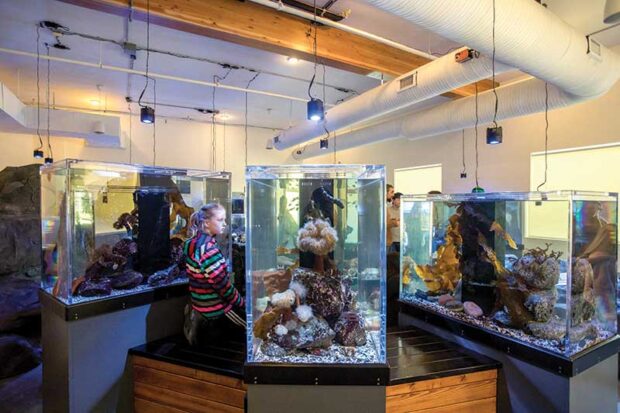Your local marine life centre needs you!

By Heather Creech
Earlier this year, the staff at the Cairns Aquarium in Queensland noticed something unusual: some of the fish stopped eating and began hiding in the dark corners of their tanks. Turns out the fish—inquisitive creatures that they are—were missing their human visitors during the pandemic lockdown. So the staff looked to the local diving community and brought in an extra diver to spend time in the tanks interacting with the residents. As the Chief Executive told a reporter, “There’s [now] more human contact going on, just to create that extra stimulation.”
Cuddling fish during a pandemic may be a one-of-a-kind experience, but there are many other ways that divers can support their local marine life centres. Large facilities such as the Vancouver Aquarium, the Shedd Aquarium in Chicago, and the National Aquarium in Baltimore provide a wonderful range of opportunities for divers to offer up time and skills.
For starters, their scientific research programs rely heavily on observations from volunteer divers—monitoring Great Lakes fish migrations with the Shedd or counting Rockfish for the Vancouver Aquarium, to name only two of the many citizen science programs underway. In most cases, these programs are easy to find with a simple email inquiry to the aquarium.
Underwater liaison
As divers found in Cairns, challenging on-site opportunities are also possible: volunteer divers can be recruited and trained to assist with cleaning and maintaining exhibits, feeding, monitoring and recording observations of aquarium life, and giving public talks to visitors. As the National Aquarium suggests, “A diver serves as an underwater liaison between our visitors and collection animals.”
But what if you don’t live near a major facility?
There are dozens of smaller aquariums and community-based marine life education centres across Canada and the U.S. Focused on local ecosystems, they have rotating displays of marine life, touch tanks, and education programs. These facilities are often anchored with a small core staff—one or two marine scientists, a dive safety officer, and public education specialists; and so they are highly dependent on volunteers to support services and programs.
Two such centres in Canada recognize the value of working with the local diving community—on the west coast, the Nicholas Sonntag Marine Education Centre (NSMEC) in Gibsons, B.C. and on the east coast, the Huntsman Marine Science Centre (Fundy Discovery Aquarium) in St. Andrews, New Brunswick.
According to NSMEC, “Opportunities for volunteer divers lie with our collect and release program. Basically heading out to look for new species under our scientific collection licence that we can temporarily display at our centre for marine education. However, we do plan to expand this into citizen science to build more of a community around the organization and enable us to collaborate and share science with other organizations.” While the Huntsman Marine Science Centre doesn’t have many diving projects at present, it recognizes that from time to time it may need photographers or people with good underwater identification skills. The Huntsman occasionally runs BioBlitz events to record as many species as possible around the community and, in conjunction with a local dive school, encourages divers to document the underwater life. In future the Huntsman hopes to run marine life identification courses to help get more divers involved in monitoring.
Getting involved
As with the larger aquariums, training is critical. Both NSMEC and Huntsman require divers to have Rescue certification (or equivalent), together with a scientific diving training course or orientation with the centre, a dive medical and a skills assessment by the Dive Safety Officer prior to any diving activities.
These small marine life centres are all about local community and would love to have local divers to help. It’s well worth a diver’s time to check out whether there is a marine education and research centre near you and how you can help.
Heather Creech is a citizen scientist with ReefWatch, dividing her time between Victoria, BC, and Adelaide, South Australia.







